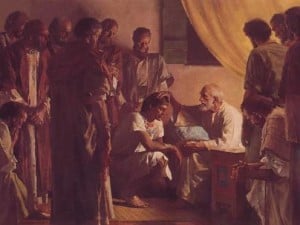Genesis 47:28-50:26
 The Torah portion describes the final 17 years of Yaacov’s life in Egypt and begins with the words Vayechi Yaacov, which means “and Yaacov lived.” These were the final years of his life and yet the portion begins with the words “and Yaacov lived.” And at this time, Yaacov’s vision for his children was beginning to blossom and Abraham’s vision and prophecy was beginning to materialize.
The Torah portion describes the final 17 years of Yaacov’s life in Egypt and begins with the words Vayechi Yaacov, which means “and Yaacov lived.” These were the final years of his life and yet the portion begins with the words “and Yaacov lived.” And at this time, Yaacov’s vision for his children was beginning to blossom and Abraham’s vision and prophecy was beginning to materialize.
To teach us that Yaacov and his destiny was very much alive. Before he physically leaves the world, though, Yaacov demands that Yoseph promises to bury him in the land of his forefathers. It seems that Yaacov knew that this oath would keep alive the yearning of all his descendants to return to that same land. He then also blesses Yoseph’s two sons, Manasseh and Ephraim, giving them the status of tribes
Yaacov at thios point desires to reveal the end of days to his children, but by Divine degree that ability is kept from him. Yet the fact that he indicated by that desire that there would in fact be be “an end of days” was enough of a promise that would empower his ancestors even through the most difficult exile. Yaacov then blesses his sons, giving each one his unique tribal destiny and character:
After Yaacov passes away a large caravan of Egyptian dignitaries join the Israelites in bringing Yaacov to his resting place in the tomb of the Patriarchs in Hevron. Yosef also asks that he be buried in his tomb in the city of Shchem , now known as Nablus but that it seems will only happen after the Israelite nation leaves Egypt . Before Yoseph passes on , he declares a critical phrase that will serve as a code phrase when Moses comes to take them out of Egypt . “G-d will surely remember you ( Pakod Yifkod) , and bring you up out of this land to the land of which He swore to Abraham, Isaac and Jacob.” this will be the code words that will begin the Exodus.
Listen to this week’s podcast:
